Does Playing Music Help Cats Relax Around New People?
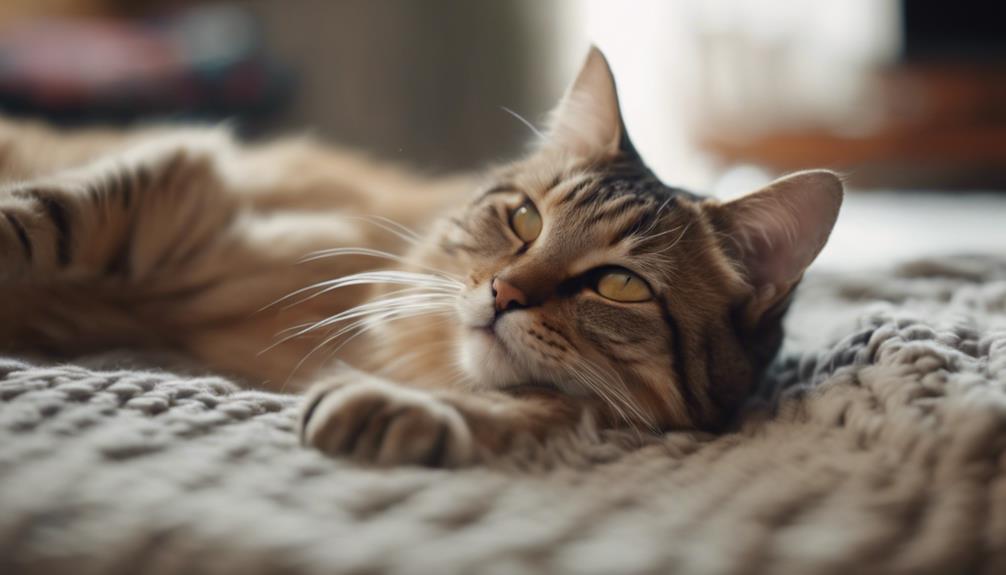
Music can have a calming effect on cats, especially when they are in unfamiliar environments or around new people. Studies have shown that classical music, soft rock, or even specially designed music for cats can help reduce stress and anxiety in felines. The soothing sounds can create a more relaxed atmosphere, making it easier for cats to adjust to new situations and feel more comfortable around strangers.
Playing music for your cat can also help mask unfamiliar noises that might be causing them distress. Loud sounds, such as traffic or construction noise, can be overwhelming for sensitive cats. By playing calming music, you can create a more peaceful environment that can help your cat feel more at ease and less on edge.
In addition to playing music, providing other forms of enrichment, such as toys, hiding spots, or interactive playtime, can also help your cat relax and feel more secure in new or stressful situations. By combining these strategies, you can help your cat feel more comfortable and confident when encountering new people or environments.
Cat Behavior and Music Preferences
When studying cat behavior and music preferences, researchers have found intriguing correlations between feline responses and specific types of music. Cats have a unique way of perceiving sounds due to their acute hearing abilities and sensory perceptions. This has led to the exploration of music therapy as a potential tool to influence cat behavior positively. Understanding how music impacts cats can offer insights into creating environments that promote their well-being.
Research suggests that cats have preferences for certain types of music based on tempo, pitch, and volume. For example, classical music with soothing melodies and gentle rhythms has been shown to have a calming effect on cats, potentially reducing stress and anxiety levels. On the other hand, loud or discordant sounds may elicit negative responses from felines, such as increased agitation or restlessness.
Effects of Music on Cat Stress Levels
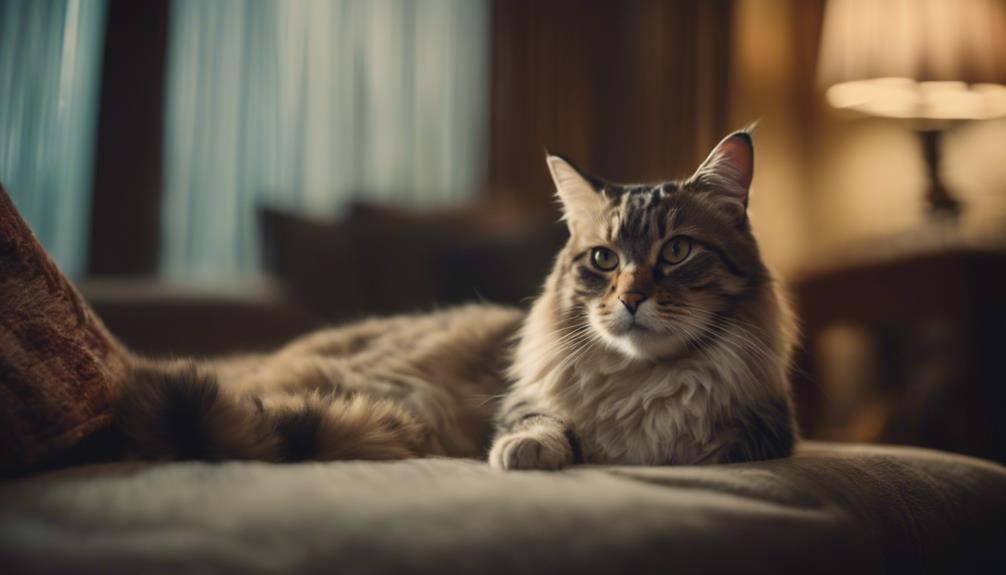
Researchers have observed that playing classical music with soothing melodies and gentle rhythms can significantly reduce stress levels in cats, offering a potential tool for enhancing feline well-being. Music therapy has shown promising results in alleviating cat anxiety and promoting relaxation. Here are three key ways music affects cat stress levels:
- Calming Effect: Certain types of music, such as classical or ambient sounds, have been found to have a calming effect on cats, helping to reduce their stress levels.
- Reduced Agitation: Music therapy has been linked to a decrease in agitation levels in cats, making them more at ease in various situations, including when interacting with new people.
- Improved Well-being: By lowering stress and anxiety levels, music can contribute to overall improved well-being in cats, leading to happier and healthier feline companions.
Understanding the impact of music on cat stress levels can provide valuable insights for individuals looking to create a more relaxed environment for their feline friends.
The Science Behind Music Therapy for Cats
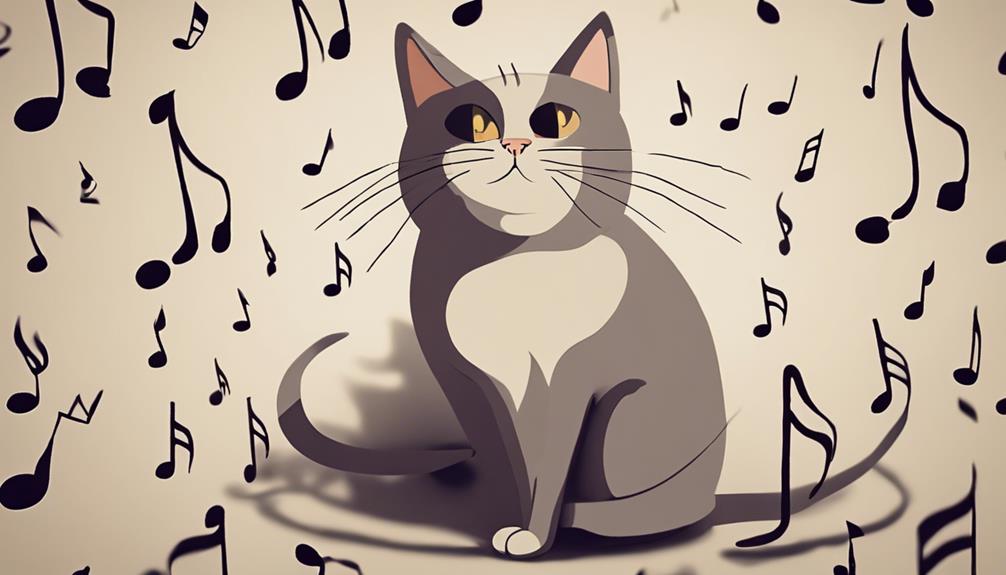
The efficacy of music therapy in reducing stress levels in cats has garnered scientific interest due to its potential benefits for feline well-being. Studies on music therapy benefits for cats have shown promising results, indicating that music can have a calming effect on these animals in stressful situations. Research into cat music preferences has revealed that certain types of music, such as classical or soft melodies, are more effective in promoting relaxation in cats compared to loud or fast-paced tunes.
One study published in the Journal of Feline Medicine and Surgery found that classical music led to decreased stress levels in shelter cats, suggesting that music can be a valuable tool in managing feline anxiety. Another research project at the University of Lisbon observed that cats showed more positive behaviors, such as increased purring and decreased hiding, when exposed to music specifically designed for them.
Choosing the Right Music for Your Cat

When selecting music for your cat, consider their genre preferences. Cats may respond differently to calming classical music versus upbeat pop tunes.
Additionally, incorporating environmental sound effects like chirping birds or gentle rain can enhance the calming effect of the music on your feline friend.
Music Genre Preferences
Choosing the appropriate music genre for your cat can significantly impact their relaxation and comfort levels around new people. When considering music for your feline friend, take into account their sound preferences and individual personality traits.
Here are three music genres that are generally well-received by cats:
- Classical Music: Known for its calming and soothing effects, classical music can help reduce stress and anxiety in cats.
- Ambient Music: This genre, characterized by gentle and atmospheric sounds, can create a peaceful environment for your cat.
- Nature Sounds: Mimicking the sounds of nature such as chirping birds or rustling leaves, nature sounds can provide a sense of security and relaxation for your cat.
Environmental Sound Effects
Cats respond positively to environmental sound effects that mimic their natural surroundings, aiding in their relaxation and comfort levels. Sound therapy through ambient sounds can create a soothing atmosphere for cats, helping them feel more at ease in unfamiliar situations. When choosing music for your cat, consider sounds like gentle rain, soft birdsong, or calming ocean waves. These environmental sound effects can help reduce stress and anxiety in felines, promoting a sense of security and well-being. By incorporating these natural sounds into your cat's environment, you can enhance their overall relaxation experience, making it easier for them to adapt to new people and surroundings. Below is a table highlighting some beneficial ambient sounds for cats:
| Ambient Sounds | Description |
|---|---|
| Gentle Rain | Mimics a calming rain |
| Soft Birdsong | Imitates birds chirping softly |
| Calming Ocean Waves | Replicates the sound of waves crashing |
Creating a Relaxing Environment With Music
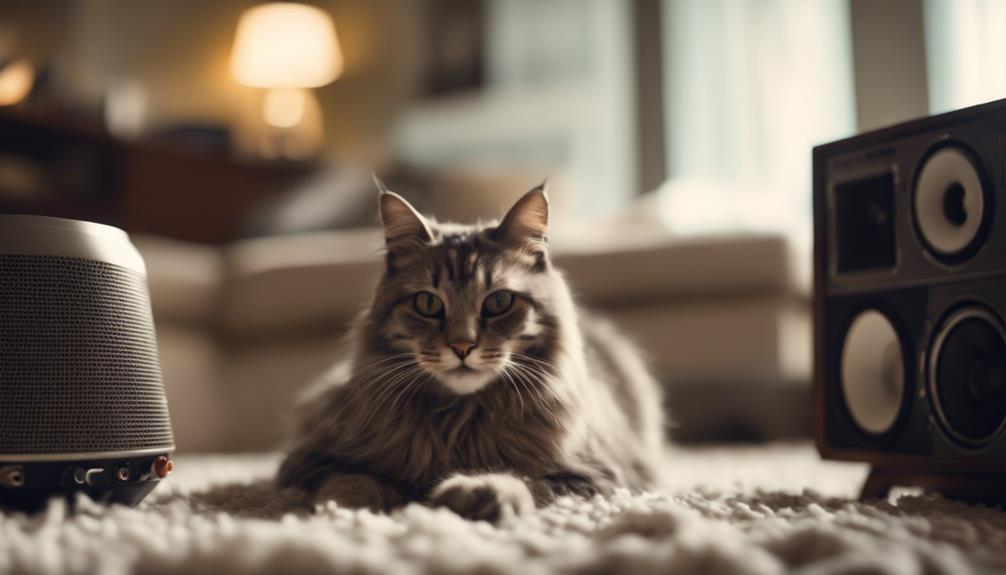
Research suggests that music can be a powerful tool for stress relief, not just for humans but for our feline friends as well.
When it comes to creating a relaxing environment for cats, choosing soothing tunes can make a significant difference in their demeanor and overall well-being.
Music for Stress Relief
In creating a relaxing environment for stress relief, music has been shown to play a significant role in promoting calmness and reducing anxiety levels. Music therapy can be a powerful tool in managing feline anxiety. Here are three ways music can help alleviate stress:
- Soothing Sounds: Soft melodies and gentle tunes can have a calming effect on cats, helping them relax and feel more at ease.
- Reduced Heart Rate: Music has the ability to lower heart rates, which can be beneficial in reducing stress and anxiety in felines.
- Distraction Technique: Engaging music can divert a cat's attention from stressful stimuli, offering comfort and relief in challenging situations.
Through the strategic use of music, cat owners can create a peaceful environment that promotes relaxation and well-being.
Soothing Tunes for Cats
Music selection is crucial in creating a calming atmosphere for feline relaxation and well-being. Calming melodies have been shown to positively impact a cat's mood modulation, helping to reduce stress and anxiety.
When choosing music for cats, it's essential to opt for soft, gentle tunes that have a slow tempo and minimal variations in pitch. Research suggests that classical music, particularly pieces with a slow tempo and a consistent rhythm, can be effective in soothing cats.
Additionally, nature sounds like birds chirping or soft instrumental music can also contribute to creating a peaceful environment for cats. By selecting appropriate music that promotes relaxation and calmness, cat owners can help their feline companions feel more at ease in various situations.
Observing Your Cat's Response to Music
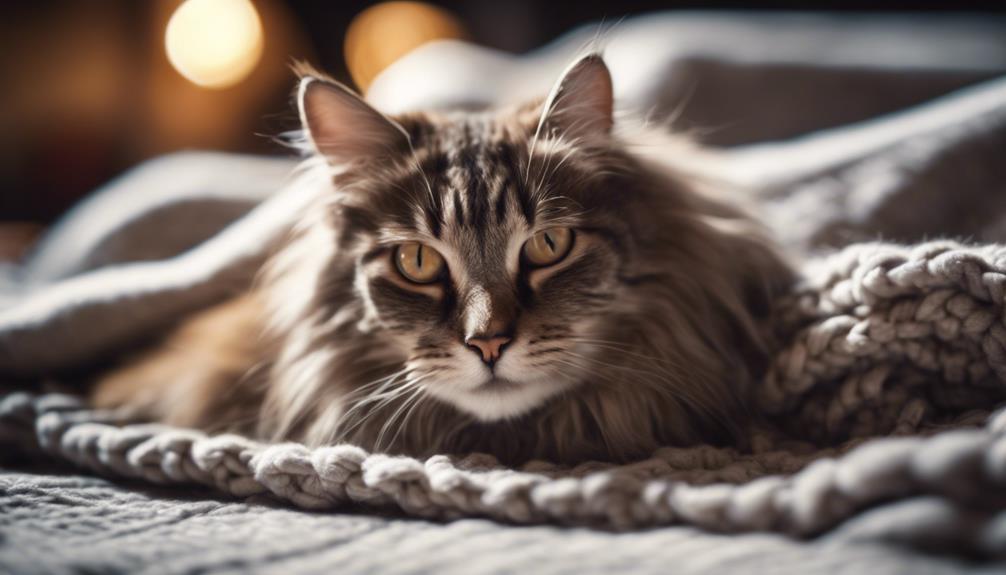
When introducing music to your cat, carefully observe their response to gauge their level of relaxation or agitation. Cats can display a variety of reactions to music, providing valuable insights into their behavioral responses.
Here are some key observations to make:
- Body Language: Watch for signs of relaxation such as kneading, slow blinking, or a relaxed posture. Conversely, signs of agitation may include flattened ears, a puffed-up tail, or dilated pupils.
- Vocalizations: Note if your cat purrs, meows softly, or remains silent while music is playing. Some cats may even exhibit chirping or chattering behavior in response to certain sounds.
- Interaction with Environment: Observe whether your cat seeks out a cozy spot, continues with normal activities, or shows signs of restlessness. How they interact with their surroundings while music is playing can give clues about their comfort level.
Tips for Using Music to Help Cats Relax
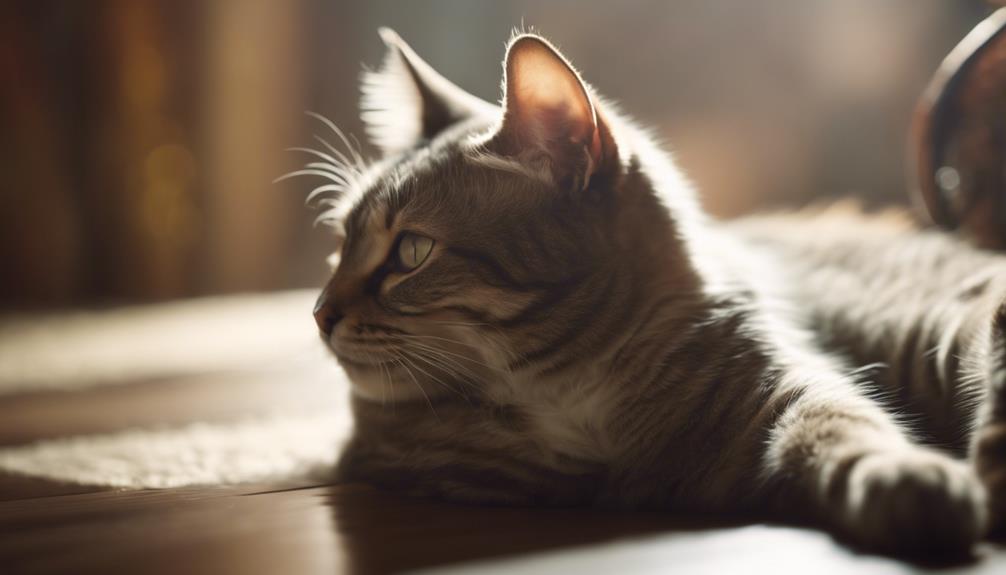
By closely monitoring your cat's responses to music, valuable insights can be gained to tailor the music selection for maximum relaxation benefits. Music therapy has been shown to be effective in reducing cat anxiety and promoting relaxation.
When using music to help cats relax, consider starting with classical music or specially designed calming music for pets. These genres typically have a slower tempo and fewer sudden loud sounds, which can help create a soothing environment for your feline friend.
It's essential to observe how your cat responds to different types of music – some cats may prefer instrumental music, while others may enjoy nature sounds or white noise. Additionally, playing music at a moderate volume is key; excessively loud music can have the opposite effect and increase stress levels in cats.
Experimenting with different music styles and observing your cat's behavior can help you fine-tune your music therapy approach to effectively alleviate cat anxiety and create a serene atmosphere for your pet.
Frequently Asked Questions
How Can I Train My Cat to Associate Music With Relaxation?
To train a cat to associate music with relaxation, start by incorporating music therapy into their routine. Gradually play calming tunes during peaceful moments, rewarding the cat with treats. Consistency and positive reinforcement will help establish the association.
Are There Any Specific Genres of Music That Cats Prefer Over Others?
When it comes to feline preferences in music therapy, studies suggest that cats may enjoy calming tunes like classical or ambient music. Such genres can foster musical bonding and aid in stress reduction for our furry friends.
Can Playing Music for My Cat Help With Separation Anxiety?
Playing music for a cat can aid in anxiety relief and behavior modification. Music therapy is known for its calming effects, making it a valuable tool for easing separation anxiety. It can promote relaxation and comfort.
Is There a Limit to How Long I Should Play Music for My Cat Each Day?
When determining music duration for cats, it's essential to consider their behavior and relaxation training needs. Establishing a routine for playing music can help create a calming environment, promoting relaxation and well-being within limits that suit the individual cat's preferences.
Can Playing Music for My Cat Have Any Negative Effects on Their Behavior or Health?
Playing music for cats can have positive effects on their well-being. However, excessive exposure may lead to behavioral changes or health risks. It's crucial to monitor the duration and volume of music therapy to ensure feline stress levels remain low.











